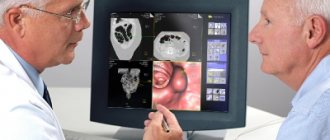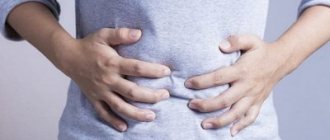» Intestinal diseases
Symptoms of constipation are very diverse depending on the etiology, evacuation function of various parts of the large intestine, the degree of impairment and duration of the disease. General disorders: weakness, fatigue, headaches, dizziness, various functional disorders of the nervous system, palpitations, pain in the heart area, often of reflex origin.
Local disorders: distension, bloating, feeling of fullness, rumbling, transfusion in the intestines, feeling of incomplete bowel movement, itching in the anus, false urges. The pain syndrome is not clearly expressed, most often it is diffuse pain in various parts of the abdomen, mainly on the left, especially intense in the rectal area, sometimes before defecation. In some cases, the pain becomes intense. Both the pain syndrome and other subjective symptoms accompanying constipation disappear or decrease after stool or the passage of gas, often abundant. A carefully collected dietary history plays an important role in analyzing patient complaints.
Proctalgia
A condition in which there is sharp pain in the rectal area, radiating to the abdomen and tailbone. The attack occurs suddenly for no apparent reason and also suddenly passes after 10-30 minutes. The pain syndrome is not associated with organic changes in the intestine and appears as a result of muscle spasm. The exact causes of proctalgia are not clear. Some experts believe that a painful attack can be caused by a psycho-emotional state or severe physical stress.
If during the examination no diseases are found that cause pain, a diagnosis of primary proctalgia syndrome is made.
Pain that occurs with proctological diseases is called secondary proctalgia.
What disease causes abdominal pain to radiate to the anus?
There are many conditions in which the lower abdomen hurts and radiates to the anus. This symptomatology can appear in women and men. There are many causes of pain, most often they relate to the female or male reproductive system.
But there are diseases when such pain occurs for reasons independent of gender.
Causes of radiating pain in women
In women, diseases that cause irradiation of pain into the anus begin acutely, requiring urgent medical attention.
These include:
- Apoplexy of the ovary. This disease is difficult to confuse with any other, since there is an acute “dagger” pain that will radiate to the anus and perineum. A sharp rupture of the ovary occurs and bleeding begins.
- Ectopic pregnancy due to implantation of the fertilized egg in the tubes or ovary. Such a pregnancy ends in tubal abortion or rupture of the fallopian tube with characteristic symptoms: pain, initially tolerable, then of a pulling nature with irradiation into the anus. If the tube ruptures, the pain is sharp, accompanied by a drop in pressure and bleeding. Emergency surgical treatment is required.
- Inflammation of the ovaries is characterized by moderate aching or dull pain in the abdomen and anus, thigh or vagina. Pain increases during stressful situations, physical exertion, and hypothermia. Localization of pain - lower abdomen, iliac regions.
- A spontaneous miscarriage begins with a pull in the lower abdomen with a discharge into the rectum, then the pain becomes cramping in nature with the appearance of bloody discharge from the vagina. This condition requires emergency hospitalization in the gynecology department, which allows you to maintain the pregnancy.
- Endometriosis is the movement of the inner lining of the uterus into neighboring organs. Severe pain, depending on the affected organ, extending to the tailbone and is not associated with menstruation.
- Diseases of the female genital area - uterus, ovaries, tubes. In addition to pain during inflammatory processes, purulent discharge appears.
- Tumors. The pain is nagging in nature, and when it reaches a significant size, it begins to radiate into the anus.
Causes of abdominal pain in men
Diseases that lead to pain that radiates to the anus in representatives of the stronger sex can be divided into groups:
- Prostatitis is inflammation of the prostate gland. The pain is aching or dull in nature, intensifying during defecation and during urination, radiating to the sacrum, anus, and scrotum;
- Orchitis is an inflammation of the testicular tissue, pain occurs in the lower half of the abdomen as a result of irritation of the sensitive receptors of the testicle and with nerve transmission to the rectum. Orchitis may be the result of mumps.
- Malignant and benign tumors of the male genital organs also cause pain.
In any case, a thorough examination by a urologist is required. Indeed, with timely consultation with a doctor, it is possible to quickly eliminate the cause of the pain syndrome, which is of particular importance in the case of the development of a tumor process. Any acute pain requires immediate medical attention.
Haemorrhoids
In the final section of the rectum and under the skin of the perineum there are vascular formations - hemorrhoids. Outwardly, they resemble small tubercles, which smooth out when excreting feces. Due to frequent constipation, heavy physical work, a sedentary lifestyle, and weightlifting, blood circulation is disrupted, blood stagnation occurs, and veins are stretched. Hemorrhoids enlarge, shift, and bleed. Over time, the tone of the anal sphincter weakens and the node falls out.
The main symptom of hemorrhoids is pain during and after bowel movements. The disease is also characterized by: burning and itching in the anus, the presence of blood in the stool and on underwear after bowel movement.
If the disease is not treated, chronic blood loss from the hemorrhoid will lead to the development of anemia.
Proctitis
An inflammatory disease that affects the mucous membrane of the rectum. It is characterized by the following symptoms: purulent or bloody discharge, painful urge to defecate, pain during bowel movement and burning after it.
There are several reasons contributing to the development of the disease:
Constant constipation. Excessive consumption of spicy, fatty foods, alcohol. Presence of parasites and pathogenic microorganisms. Food poisoning. Violation of gastric secretion. Mechanical damage.
The disease can occur in acute or chronic form. Acute proctitis appears suddenly, accompanied by fever, tenesmus, heaviness and burning in the rectum intestinum.
Depending on the nature of the damage to the mucous membrane, there are four main types of disease:
Polypous proctitis. Polyps form on the mucous membrane. Ulcerative proctitis. Erosion and ulcers form. Catarrhal-hemorrhagic proctitis. The intestinal mucosa is dotted with petechiae (small hemorrhages). Catarrhal-purulent proctitis. It manifests itself as ulcers and purulent wounds.
Chronic proctitis begins asymptomatically; itching may be observed in the anal area. Symptoms of the disease appear as the process progresses. With the atrophic form of the disease, the mucous membrane of the rectum becomes thinner. The hypertrophic appearance is characterized by thickened and loose folds.
Despite the fact that the functions of the rectum intestinum are not impaired, complications in the form of scars, inflammatory processes in the overlying parts of the gastrointestinal tract, rectal fistulas and malignant formations cause great harm to health.
What is TFR?
When complaining about the functioning of the digestive tract, the patient must first of all exclude: inflammatory processes, benign or malignant formations and other pathological conditions. If none of the above has been identified, then an exception diagnosis may be made - “irritable bowel syndrome”. This is a functional disorder.
According to the explanation of gastroenterologist Sergei Lebedev, IBS is based on various mechanisms. But in the vast majority of cases, the reason lies in the increased sensitivity of the intestinal nerve fibers to various stimuli. Even in familiar situations, the intestines react more aggressively than they should normally, changing their motility.
IBS is comparable to “bear disease,” which means that due to stress (an upcoming trip to the dentist, an important interview or an exam at an educational institution), a person begins to have diarrhea, as well as various unpleasant sensations in the stomach. Something similar happens with irritable bowel syndrome.
Paraproctitis
Inflammation of the fatty tissue of the rectum with the formation of ulcers. Clinical manifestations of the disease:
Pain in the lower abdomen, rectum and perineum, worsening during bowel movements. High temperature and chills. Loss of appetite, malaise. Redness and swelling in the anus. Retention of feces and urine.
The main cause of the disease is infection of fatty tissue with E. coli, streptococci, staphylococci, and anaerobic bacteria. The development of the disease is facilitated by cracks, intestinal injuries, hemorrhoids, cystitis, urethritis, and prostatitis.
According to the course, paraproctitis is divided into acute and chronic.
Acute paraproctitis is provoked by infections entering through the crypts (recesses) of the anus. The process can occur under the skin or deep in the pelvic cavity.
Chronic paraproctitis usually develops against the background of an advanced acute form of the disease. A fistula forms at the site of the abscess. By signs such as pus mixed with blood, you can recognize the formation of a fistula.
Anal fissure
An anal fissure is a microtear in the mucous membrane of the anal canal. In most cases, the fissure is formed as a result of mechanical trauma to the rectum and bowel dysfunction.
Burning pain during defecation, which goes away a few minutes after it, blood in the stool, spasm of the anal sphincter are the main symptoms of the disease.
Usually the crack heals on its own. But prolonged constipation, straining during bowel movements, hemorrhoids, and bacterial inflammation increase the likelihood of the acute form of the disease becoming chronic. The edges of the crack become denser. The main manifestations of the disease include: itching, pain when sitting.
Colitis
An inflammatory process in the rectum and colon, caused by food poisoning, intestinal infections, unbalanced nutrition, food allergies, antibiotic use, mechanical irritation of the mucous membrane of the organ.
In the acute course of the disease, redness and swelling of the intestine are observed, ulcerations and erosions form. The patient has bloating, stool upset, and tenesmus. Mucus and blood appear in the stool. Many patients complain of weakness, fatigue, and general malaise.
In the chronic form of colitis, the epithelium thickens, the submucosal and muscular layers are affected, and the mucous membrane atrophies. The main symptoms include pain, which decreases after defecation, and rumbling in the abdomen.
Every patient should know that colitis is a serious disease that can lead to intestinal bleeding and perforation of the colon.
Causes and treatment of rumbling in the intestines
Why is my stomach churning? Rumbling and seething in the stomach is possible for the following reasons:
- poor digestibility of foods with a high gluten content, or intestinal intolerance to gluten, resulting in a stylish rumbling in the stomach after eating;
- consumption of dairy products with a lack of lactose in the stomach;
- physiological characteristics of a person.
Rumbling in the stomach can be associated with hunger in the stomach and intestines. The migrating motor process begins when there is no food in the stomach for more than 2 hours; receptors pulsate throughout the entire branch of the intestine, causing it to contract and emit loud sounds. This is not dangerous. The endothelium of the rectum begins to secrete the hormone motilin, thanks to which the intestines carry out a process of cleansing of waste and toxins. When motility fails, the stomach begins to swell, pain and nausea appear.
Prolapse of the rectum
Organ prolapse occurs due to a decrease in the ability of the pelvic floor muscles to withstand pressure when straining. Rectum intestinum exits through the anal sphincter to the outside. Constipation, diarrhea, hemorrhoids, and heavy physical labor contribute to loss.
In the compensated form of the disease, the intestine is reduced on its own due to the ability of the muscles to contract and maintain tone. If muscle functions are lost (decompensated form), the organ is reset manually.
Prolapse is accompanied by incontinence of feces and gases.
Rectum intestinum falls out suddenly when lifting heavy weights or the pathology develops gradually.
In both cases, the symptoms of prolapse are the same:
Mucous discharge. Various pains in the lower abdomen. Constant urge to defecate. Frequent urination. Heaviness and sensation of a foreign body in the anal canal.
In severe cases, when the small intestine prolapses into a pocket formed between the walls of the rectum, intestinal obstruction occurs.
You cannot straighten the intestine on your own. Improper actions can lead to tissue death as a result of pinching of blood vessels.
Rectal hernia
Weakening of the pelvic muscles leads to disruption of intestinal fixation. Under certain conditions, it goes beyond its anatomical location.
There are several reasons that contribute to the formation of a hernia: constipation, difficulty urinating, childbirth, severe cough, lifting heavy objects, weakening of the abdominal wall, functional insufficiency of the sphincter.
The main manifestations of the disease: nagging pain in the pelvic area, constipation, difficulty defecating, and stool.
In women, part of the rectum may protrude from the pelvis into the vagina through the rectovaginal septum.
As the disease progresses, stool evacuation becomes more difficult.
Polyps
Benign neoplasms that grow from cells of the mucous membrane of the intestinal wall are considered by experts as a precancerous condition. There are several types of polyps. Villous and adenomatous tumors are considered the most dangerous. They have a high level of malignancy. The larger the size of the pathological growth, the greater the risk of its degeneration into cancer.
Experts have not come to a consensus regarding the formation of polyps, but numerous observations indicate that tumors develop against the background of chronic inflammatory diseases of the rectum (dysentery, colitis). Hereditary predisposition also provokes the formation of polyps.
At the initial stage, the outgrowths do not manifest themselves. Some patients complain of slight discomfort during bowel movements. But as they grow, polypous growths begin to interfere with the evacuation of feces and contribute to the development of intestinal obstruction. Mucus and scarlet blood appear in the stool. If the polyp becomes inflamed, the temperature rises. In the later stages, anemia is added to these symptoms. Polyps with a long stalk, located at the exit from the intestine, can be pinched in the sphincter or fall out of the anal canal.
But the biggest danger is degeneration into a cancerous tumor. Therefore, polyps must be removed.
Evolution of the syndrome
Sergey Lebedev claims that today the World Organization of Gastroenterologists refute the direct connection between IBS and intestinal cancer or its inflammatory pathologies. However, this process cannot be left to chance. Often this syndrome evolves into other gastrointestinal disorders or one disease overlaps with another.
In some cases, IBS is combined with gastroesophageal reflux, dyspepsia or functional constipation. With this in mind, any discomfort from the digestive tract cannot be ignored. In this case, consultation with a specialized specialist is mandatory. The doctor will be able to make an accurate diagnosis and select the right therapy.
Condylomas acuminata
A viral disease caused by the human papillomavirus. Small gray-pink growths form around the anus. They can grow and block the anal canal. Patients note a sensation of a foreign body, itching and burning during and after bowel movements, and bleeding. If condylomas are injured by feces or underwear, pain occurs.
Neoplasms can transform into malignant tumors. The disease progresses especially against the background of weakened immunity.
Diagnosis of IBS
To identify irritable bowel syndrome, the following examinations are performed:
- general clinical blood test;
- stool examination for occult blood;
- serological test for celiac disease;
- stool testing to detect intestinal parasites;
- colonoscopy examination.
Additionally, the patient may be sent for a consultation with an endocrinologist, who will prescribe a hormonal test of thyroid function.
Cancer
Malignant neoplasms affect the walls and over time can completely fill the lumen of the organ.
Tumor development is promoted by:
Genetic factors, for example, diffuse polyposis. Poor nutrition. Constipation. Chronic inflammatory diseases (proctitis, colitis, anal fissures).
The main symptom of the disease is discharge in the form of mucus, pus, blood, and pieces of epithelium. Frequent and painful urge to defecate also warns of the problem; pain radiating to the perineum and lower back; foreign body sensation; change in the shape of stool (resembles a ribbon).
In cases where the tumor grows into the muscles that compress the anus, the patient cannot control the passage of gases and feces. As the disease progresses, weight loss occurs, weakness appears, and the temperature rises slightly.
In advanced forms of cancer, there is constant severe pain in the entire abdominal area. When a tumor grows into the bladder, a fistula is formed, and urine is released from the rectum along with feces.
Cancerous tumors most often metastasize to the groin, lymph nodes of fatty tissue, and liver.
Pay attention to symptoms associated with rectal disease. Each disease is dangerous in its own way. Timely seeking medical help will help maintain health.
Do you still think that healing your stomach and intestines is difficult?
Judging by the fact that you are now reading these lines, victory in the fight against diseases of the gastrointestinal tract is not yet on your side...
Have you already thought about surgery? This is understandable, because the stomach is a very important organ, and its proper functioning is the key to health and well-being. Frequent abdominal pain, heartburn, bloating, belching, nausea, bowel dysfunction... All these symptoms are familiar to you firsthand.
But perhaps it would be more correct to treat not the effect, but the cause? Here is the story of Galina Savina, about how she got rid of all these unpleasant symptoms... Read the article >>>
Irritable bowel syndrome or noise, rumbling in the stomach and intestines: causes
Abdominal sounds are bowel sounds produced by bowel movements as food passes through the bowel. Bathed in acid, food moves back and forth and gradually moves further through the intestines. At this time, the breakdown and absorption of nutrients occurs. Sometimes this process is accompanied by certain sounds. After four to six hours, most of the food has left the stomach. The sounds of an empty bowel are similar to the sounds of water pipes.
Most bowel sounds are harmless and simply mean that the gastrointestinal tract is working. The doctor can check for abdominal sounds by listening to the abdomen with a stethoscope. However, there are some cases where unusual bowel sounds can provide valuable information about the health of the body.
One such example is intestinal obstruction. This is a condition in which there is no bowel activity. Many reasons can lead to intestinal obstruction. It is important to diagnose it early because gas, fluid and intestinal contents can build up and cause damage or rupture of the intestinal wall. The doctor may not be able to hear bowel sounds when listening to the abdomen.
Decreased volume, timbre, or regularity of sounds. This is a sign that intestinal activity has slowed down. Overactive bowel sounds are normal during sleep and also occur typically for a short time after the use of certain medications and after abdominal surgery. Such sounds can sometimes be heard even without a stethoscope. Loud bowel sounds like this mean that there is increased bowel activity, this can happen due to diarrhea and after eating.
Decreased or absent bowel sounds often indicate constipation. Abdominal sounds are always assessed along with a symptom such as frequency or absence of bowel movements. If other warning symptoms are present in addition to hypoactive or hyperactive bowel sounds, you should contact your healthcare provider.
Causes of noise and rumbling in the stomach
Common causes of hyperactive, hypoactive, or absent bowel sounds include:
- Circulatory disorders. Blocked blood vessels prevent the intestines from receiving proper blood flow.
- Mechanical intestinal obstruction caused by a hernia, tumor, adhesion, or similar condition that may block the intestine.
- Medicines that slow bowel movement, including codeine, anticholinergics, and phenothiazines.
- General anesthesia.
- Radiation therapy performed in the abdominal area.








